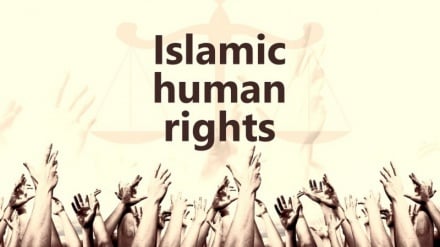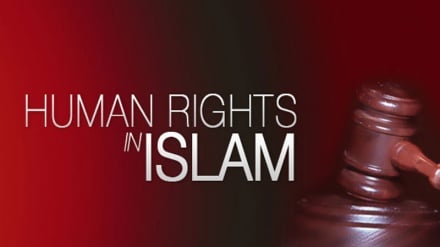Islamic Human Rights (37)
Welcome to this week’s episode of the series Islamic Human Rights. Today, we speak of freedom of expression in Islamic human rights within the framework of discovery of the truth and demand for justice.
In an Islamic ruling system, the responsibility of members of the community is not separable from the responsibility of the government. If governments administer the community, people are also the beneficiary members of the same community and are directly affected by the deeds of statesmen. Hence, based on wisdom and prudence, members of the community maintain a right and obligation to supervise the performance of officials, in order to prevent them from possible diversion from the righteous path.
The right to supervise the performance of the ruling system and officials is one of the most fundamental rights of mankind in political and social life. Acceptance and compliance with these rights in the community is tantamount to recognition of the freedom of expression and criticism as one of the most important prime examples of political freedom. Holy Quran has recognized this right. In Holy Quran, the right to supervision has been taken into consideration within the framework of promotion of virtues and prevention of vice, and the right of freedom of expression has been taken into account within the framework of discovery of the truth and demand for justice. We study this type of political freedom from the viewpoint of Holy Quran.
In Holy Quran, people’s supervision has been presented and introduced within the framework of promotion of virtues and prevention of vice, while this kind of supervision has been considered as people’s right and obligation, both. Holy Quran encourages people to implement their right to supervision via promotion of virtues and prevention of vice, while also pointing out some of the consequences of non-materialization of this right and obligation. In an ayah of Holy Quran, Luqman has been cited as encouraging his child to fulfill and materialize his right of supervision.
The 17th ayah of Surat Luqman notes: “O my son! Maintain the prayer and bid what is right and forbid what is wrong, and be patient through whatever may visit you. That is indeed the steadiest of courses.”
In the view of Holy Quran, the public supervision of the faithful is of such a paramount importance that as the result of this supervision, the Islamic Ummah has been named as the superior Ummah.
The 110th ayah of Surat Al-I’Imran notes: You are the best nation ever brought forth for mankind: you bid what is right and forbid what is wrong, and have faith in Allah.
Another ayah introduces collective supervision within the framework of promotion of virtues and prevention of vice as a must.
The 104th ayah of Surat Al-I’Imran notes: “There has to be a nation among you summoning to the good, bidding what is right and forbidding what is wrong. It is they who are the felicitous.”
Another ayah of Holy Quran mentions the close bond of promotion of virtues and prevention of vice with political and social life and governance.
The 41st ayah of Surat al-Hajj notes: “Those who, if We granted them power in the land, maintain the prayer, give the zakat, and bid what is right and forbid what is wrong. And with Allah rests the outcome of all matters.”
This ayah shows the importance of promotion of virtues and prevention of vice as an integral part of people’s supervision in the divine religion of Islam.
There are many ayahs of Holy Quran, calling for promotion of virtues and prevention of vice. Also, a number of other ayahs refer to the consequences of absence of this right and obligation. The 116th ayah of Surat Hud notes: “Why were there not among the generations before you a remnant of the wise who might forbid corruption in the earth, except a few of those whom We delivered from among them? Those who were wrongdoers pursued that in which they had been granted affluence, and they were a guilty lot.”
This ayah considers the absence of those, who forbid corruption in communities as a cause of the downward spiral of those communities and emphasizes that silence, indifference, and lack of supervision destroys communities. On this basis, those, who refuse to implement this supervision, are damned by these ayahs.
The 78th and 79th ayahs of Surat al-Maidah note: “The faithless among the Children of Israel were cursed on the tongue of David and Jesus son of Mary. That, because they would disobey and they used to commit transgression. They would not forbid one another from the wrongs that they had committed. Surely, evil is what they had been doing.”
Upon consideration of these ayahs, the significant importance of promotion of virtues and prevention of vice becomes clear more than ever. In the view of Holy Quran, if this right and obligation is truly fulfilled, corruption will be wiped out in the considered community. In this manner, it can be concluded that Holy Quran has recognized the right of supervision. In other words, promotion of virtues and prevention of vice is a legitimate duty, which leads to recognition of people’s right to supervise, by God Almighty.
Some of the ayahs of Holy Quran have emphasized the right of expression as a necessity for discovery of the truth. For instance, the 17th and 18th ayahs of Surat al-Zumar note: “So give good news to My servants who listen to the Word of Allah and follow the best sense of it. They are the ones whom Allah has guided, and it is they who possess intellect.”
This ayah gives good news to those who listen to the Word of Allah and follow the best sense of it. Obviously, this is possible if the individuals would be permitted to express themselves. So this ayah considers the necessity of freedom of expression.
The 125th ayah of Surat al-Nahl notes: “Invite to the way of your Lord with wisdom and good advice and dispute with them in a manner that is best.”
This ayah points out three methods for dealing with opponents, namely wisdom, good advice, and dispute in a manner that is best. In each of these methods, the Prophet allows his opponents to express their views.
Another ayah considers recognition of freedom of expression on the basis of finding the truth.
The 6th ayah of Surat Al-Tawbah notes: “If any of the polytheists seeks asylum from you, grant him asylum until he hears the Word of Allah. Then convey him to his place of safety. That is because they are a people who do not know.”
In this ayah, polytheists have been allowed to express their view. Focus on this ayah and other ayahs shows that Holy Quran even recognizes freedom of expression for opponents and polytheists.
Holy Quran has also considered freedom of expression in order to demand for justice. Holy Quran considers the statement of the inappropriate behavior of individuals only when one demands justice.
The 148th ayah of Surat al-Nisa notes: “Allah does not like the disclosure of anyone’s evil conduct in speech except by someone who has been wronged, and Allah is all-hearing, all-knowing.”
In this manner, whenever an injustice has been imposed on an individual, the oppressed individual can express the inappropriate behavior of the oppressor, in order to demand justice.
MR/MG


